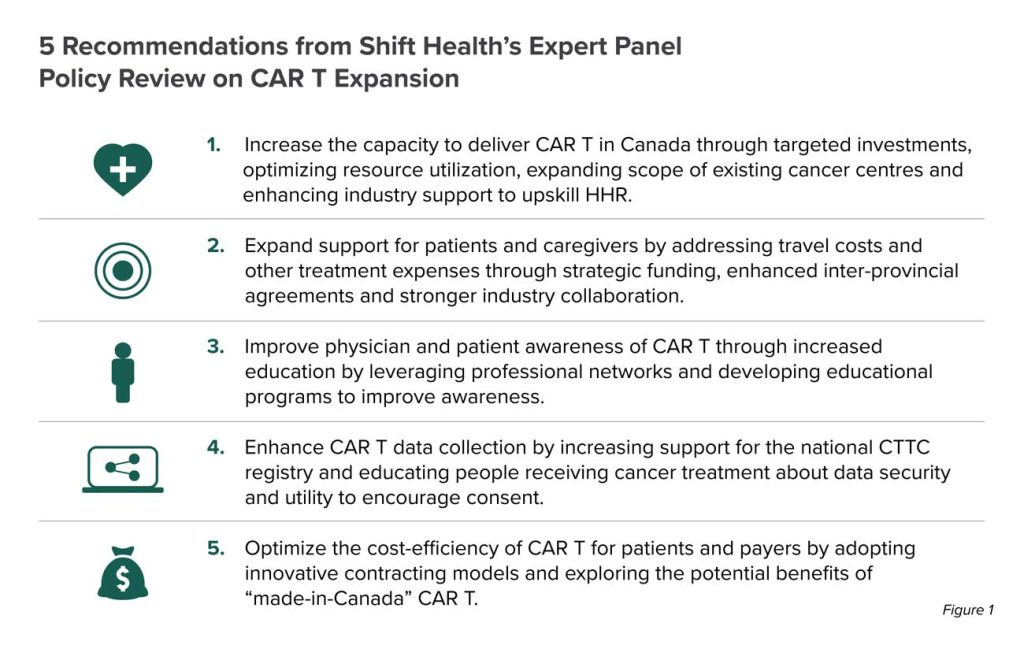Each and every day, the Canadian Cancer Society estimates that 675 Canadians will be diagnosed with cancer and 241 will die of cancer. Ten percent of those cancer diagnoses in Canada are represented by blood cancers. Though the numbers paint a stark picture, with diagnoses increasing each year due to an aging and growing population, Canada has made significant strides in offering innovative treatments. Like many other developed nations, Canada now offers CAR T-cell therapy (Chimeric Antigen Receptor T-cell therapy), a treatment for difficult-to-treat blood cancers that harnesses an individual’s immune system to attack certain types of cancer cells. Though treatments offer hope to thousands of patients and their loved ones across the country, there remains work to be done as demand for CAR T today is already outpacing the capacity of Canada’s healthcare system to provide treatment for those who are eligible to receive it.
“The provinces have made incredible strides in offering the latest in cell therapy treatments to patients in Canada,” says Paul Petrelli, General Manager of Gilead Sciences Canada. “However, we are far from keeping pace with increased demand.”
As research continues to evolve, anticipated new approvals for CAR T therapies for earlier lines of treatment and new indications will likely result in increased demand in the coming years. Similar to many innovative treatments, CAR T requires a centralized model of treatment delivery due to complex infrastructure and knowledge which ensure safe and effective delivery.
As Canada strives to achieve the objectives set out in the Canadian Strategy for Cancer Control, ensuring Canadians have timely and low-barrier access to novel treatments will be essential to meet key priorities – delivering high-quality care in a sustainable, world-class system through best practices and standards of care delivery, and implementation and expansion of new models of care.
Canadian patients have already experienced the impact of receiving CAR T-cell therapy. Rod Delaney, mayor of Cupids, Newfoundland, endured a decade-long battle with cancer. Diagnosed with stage four of non-Hodgkin lymphoma, he went through years of cancer treatments that had limited and short-term results. When Rod’s cancer returned as a more aggressive form of blood cancer, he became eligible for CAR T as a therapeutic option. Though Rod would credit CAR T for allowing him to resume his life, accessing treatment took a heavy toll on his family. Unable to obtain CAR T in his home province, Rod, his wife, Joanne Wells, and their two dogs, travelled to Ottawa for several months so Rod could receive specialized care at one of 12 centres in Canada currently offering the treatment to adults. With only major urban settings offering CAR T, enormous barriers and burdens fall on patients who do not live within a day’s drive. Now in full remission, Rod and Joanne can begin to love life again, spending time with family and friends, but the financial and emotional scars of their ten-year cancer journey are still fresh.
Familiar with Rod’s story and others with similar experiences, Petrelli notes that, “There are capacity concerns at existing treatment centres that can only cater to a fraction of the provincial demand, thus forcing patients to seek care out-of-province. We see a heavy burden for patients who have to travel long distances for treatment, and we know far too well that waiting for treatment is not an option for many people with life-threatening blood cancers.” This is echoed in a recent report developed by the Canadian Cancer Statistics Advisory Committee outlining the upheaval a cancer diagnosis can cause to Canadians’ emotional, physical, and financial wellbeing. Earlier and more equitable access to CAR T could help alleviate some of the impacts of prolonged treatment programs.
Barriers to accessing CAR T for many Canadians are due to the limited capacity of current treatment centres and their presence in major urban areas only
Given the barriers to accessing CAR T for many Canadians is expected to worsen as demand surges, in fall 2024, Gilead Sciences Canada engaged Shift Health to convene a multidisciplinary Expert Panel comprised of healthcare providers, administrators, a regulatory expert, and a patient advocate in an independent study focused on developing a set of tangible and feasible recommendations for improving access to CAR T in Canada over the next 2-5 years. The discussions resulted in five recommendations (Figure 1) to improve delivery today and prepare for the anticipated surge in demand. These recommendations (available in full in the Shift Health’s Expert Panel Policy Review) highlight specific short- and long-term policy recommendations to better position our nation to support CAR T capacity needs.

Canada requires a strategic approach to keep pace with demand and improve access equity to this potentially life-changing therapy to ensure that all eligible people living with cancer can achieve their best possible outcome.
To read the Shift Health policy document on CAR T capacity, please click here.


